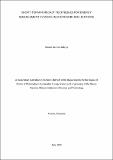| dc.description.abstract | In the 2015 Paris Agreement, 195 countries adopted a global climate agreement to limit the
global average temperature rise to less than 2°C. Achieving the set targets involves increasing
energy efficiency and embracing cleaner energy solutions. Although advances in computing
and Internet of Things (IoT) technologies have been made, there is limited scientific research
work in this arena that tackles the challenges of implementing low-cost IoT-based Energy
Management System (EMS) with energy forecast and user engagement for adoption by a
layman both in off-grid or microgrid tied to a weak grid.
This study proposes an EMS approach for short-term forecast and monitoring for hybrid
microgrids in emerging countries. This is done by addressing typical submodules of EMS
namely: load forecast, blackout forecast, and energy monitoring module. A short-term load
forecast model framework consisting of a hybrid feature selection and prediction model was
developed. Prediction error performance evaluation of the developed model was done by
varying input predictors and using the principal subset features to perform supervised training
of 20 different conventional prediction models and their hybrid variants. The proposed
principal k-features subset union approach registered low error performance values than
standard feature selection methods when it was used with the ‘linear Support Vector Machine
(SVM)’ prediction model for load forecast. The hybrid regression model formed from a fusion
of the best 2 models (‘linearSVM’ and ‘cubicSVM’) showed improved prediction performance
than the individual regression models with a reduction in Mean Absolute Error (MAE) by
5.4%.
In the case of the EMS blackout prediction aspect, a hybrid Adaptive Similar Day (ASD) and
Random Forest (RF) model for short-term power outage prediction was proposed that predicted
accurately almost half of the blackouts (49.16%), thereby performing slightly better than the
stand-alone RF (32.23%), and ASD (46.57%) models. Additionally, a low-cost EMS smart
meter was developed to realize the implemented energy forecast and offer user engagement
through monitoring and control of the microgrid towards the goal of increasing energy
efficiency. | en_US |

